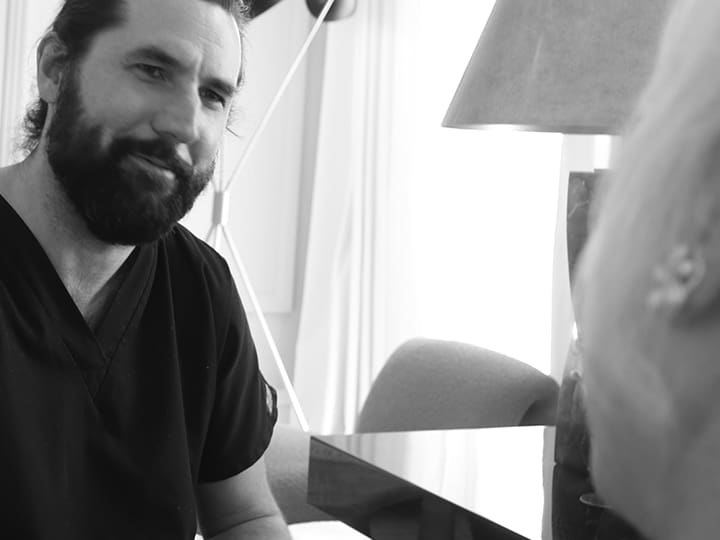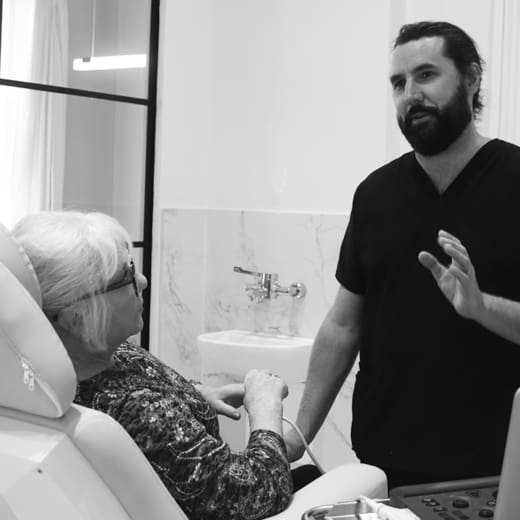McKeown Medical
167 Bath Street, Glasgow, G2 4SQ
Date posted — 4.06.25

If you’ve been diagnosed with varicose veins, you might find yourself overwhelmed with information, especially if all you’ve heard about are older, more invasive treatment options like vein stripping. For many, particularly those who have grown up with the NHS, the idea of ‘having your veins pulled out’ is familiar and understandably daunting.
But varicose vein treatment has come a long way. Today, there are modern, minimally invasive procedures that are not only more comfortable but also have less downtime and fewer complications. At McKeown Medical, we offer these advanced solutions and take the time to help you understand what’s right for your unique situation.
Vein stripping is a surgical procedure that involves removing the great saphenous vein, the main superficial vein running from your groin to your ankle. Traditionally, it was performed under general anaesthetic, requiring incisions in the groin and leg. The vein would be tied off (or ligated) and then physically pulled out using a wire or similar device.
This method was widely used for decades as the standard treatment for varicose veins, particularly before the development of modern technologies. While it can be effective in removing problematic veins, it comes with several significant drawbacks.
Vein stripping can still be required in some circumstances, for example, if the diameter of the great saphenous vein is simply too large for the newer, less invasive options. Thankfully, however, this typically only applies to less than 1% of patients. Most patients are suitable for the less invasive options.
Given these concerns, it’s easy to see why many patients and doctors now turn to less invasive, more advanced options.
At McKeown Medical, we focus on evidence-based, modern treatments designed to deliver excellent results with minimal discomfort and downtime.
RFA is a minimally invasive procedure that uses radiofrequency energy to heat and seal off the faulty vein. It’s performed under local anaesthetic using ultrasound guidance.
Benefits:
Venaseal
Venaseal is a cutting-edge treatment that uses a medical-grade adhesive to close off the faulty vein. The glue is delivered through a catheter and gently seals the vein shut, rerouting blood to healthier veins.
Benefits:
This is a particularly appealing option for patients who are needle-sensitive or want the gentlest possible treatment with the least amount of post-procedure care.
A versatile treatment where a medicated foam is injected into the vein, causing it to collapse and be reabsorbed by the body over time.
Best for:
Often used alongside RFA or sclerotherapy, microphlebectomy involves the removal of individual bulging veins through tiny skin incisions, with no stitches required.
Benefits:
These treatments have revolutionised the management of varicose veins, offering targeted, effective relief without the need for outdated surgery. Learn more about varicose vein conditions and treatment here.
Modern varicose vein treatments are safer, less invasive, and more comfortable. They can be performed as outpatient procedures, meaning you can go home the same day, with minimal downtime.
In most cases, vein stripping is no longer necessary and is rarely the best initial option. Thanks to innovations like RFA, foam sclerotherapy, and microphlebectomy, patients can now achieve outstanding results with significantly fewer risks and a faster return to daily life.
At McKeown Medical, we understand that choosing the right treatment can be confusing, especially when you haven’t had the time or support to explore your options properly. That’s why our vein specialists take the time to listen to your concerns, assess your condition thoroughly, and design a personalised treatment plan that works for you.
Whether you’re dealing with large bulging veins, aching and heaviness, or are simply concerned about appearance, we offer a range of the most advanced treatments in a calm and expert setting.
At McKeown Medical, we have a wide range of treatment options available if you struggle with varicose veins. To discuss which treatment may be best for you, book a consultation today.

Varicose veins are enlarged, twisted veins that often appear just under the skin, primarily in the legs and feet.
1 / 3
2 / 3
3 / 3

Varicose veins are enlarged, twisted veins that often appear just under the skin, primarily in the legs and feet.
As all of our patients know, the neck is the one part of the anatomy we always struggle to treat without surgery.
This patient underwent CoolSculpting to reduce some of the excess fatty tissue under her chin, followed by @sofwave.uk to tighten the skin. This is still early days for her, but we can see she is already well on her way to a great result.
When it comes to the neck, combination treatments are usually the answer to the best results.
What do you think?

We have an exciting new addition to the clinic - Visia skin analysis.
We’ve had a growing focus in the clinic on skin quality and skin health over the years with more and more investment in lasers and devices that improve skin quality as the foundation of what we do in aesthetic medicine.
The Visia is a great tool for helping us to analyse the skin and track progress of treatments over time. As well as doing a thorough analysis of all the components of sun damage and skin health, it also gives us an estimate of our ’true age’, which is a reflection of the condition of our skin compared with average for our age.
This is one of my own analysis images. It got my ’true age’ pretty much spot on with my chronological age, which is perhaps surprising given that I spent most of the 90s lying under a sun bed. What was interesting is that I scored really well on superficial pigment and redness, which is consistent with the fact that I love BBL and have a treatment a few times per year. I scored less well on deeper pigment and texture issues, which I guess is consistent with the fact that I’ve not had a Halo laser for nearly 4 years now. So I guess I will be booking another Halo for myself very soon!!!
We`re offering the Visia skin analysis free as part of our laser consultation process. If you`re interested in laser treatment, come in for a consultation with Dr Sharon and you’ll have your analysis done as part of planning your treatment strategy.
You’ll also be scanned again after your course of treatment so we can track your progress.
What do you think of this new addition to the practice?

I am very humbled to share these incredible reviews from our patients.
We are very fortunate to have a team who LOVE their work and will always go the extra mile to ensure our incredible patients are properly taken care of at every step of their journey with us.
We couldn’t do what we do without our incredible (and growing!) team and I am so proud of every one of them.
We have some very exciting developments on the horizon, so keep watching this space!

Laser eye rejuvenation! Thank you to our lovely patient for allowing us to share her photos, just one week after her laser eyelid rejuvenation.
Crepe skin, loose skin, wrinkles are all common signs of ageing around the eye which do not respond well to surgery. The optimal treatment for these problems is laser resurfacing - which is exactly what this patient had.
We’ve been performing these treatments in the clinic for several years, although I’ve recently modified the technique to achieve incredible results with less downtime.
What do you think?

Here’s another fantastic result from our phenomenally talented plastic surgeon, @bramhallplasticsurgery .
As we age, the eyebrows naturally descend which allows excess skin to fall into the upper eyelids. The two main surgical options to address this are a brow lift, an upper eyelid lift (upper blepharoplasty) or both, but for many patients the most appropriate option is also the simplest: to leave the brows exactly where they are and address the excess skin at the eyelids alone.
Upper blepharoplasty is a straightforward procedure with scars hidden in the natural eyelid crease, making them very hard to see once healed. Brow lifts are usually more involved, often require a general anaesthetic, and tend to create a more noticeable change to the face.
The aim with upper eyelid surgery is subtle improvement - looking fresher and more rested, without it being obvious that you’ve had anything done.
This 42-year-old gentleman had a bilateral upper blepharoplasty under local anaesthetic and is shown here six months after surgery.
What do you think?

With darker evenings and fewer social engagements, January is a great time to think about treatments which benefit from a little down time or those that will deliver their best results by spring.
Here’s Dr Darren with his top recommendations for treatments to have over the winter months, including Sofwave, HALO, full-field resurfacing and varicose vein treatment, all of which will deliver beautiful results in time for the weather getting better and social calendars filling up!
Which treatments are you planning?

Another year, another round of incredible transformations from our team at McKeown Medical!
Eye bags banished, jowls lifted, skin refined, veins gone. Thank you so much to all of our patients who have allowed us to share their photos with you and thank you to our incredible team who work so hard to take care of every patient who trusts us with their care.
Here’s to 2026 and another year of incredible transformations!

“But Daddies, WHEN is Santa coming? I want to wait up for him!”
Happy Christmas to all, and to all a good night 🎅🏻

Laser rejuvenation of the eye area can be an incredibly powerful tool for the right patients, especially those whose ‘bags’ are more about loose skin and fine lines, like this lovely patient here.
We treated her with full field ablation, which takes around 2 weeks to recover from. Her she is a few weeks later and you can see how much tighter the skin is, the crepey skin has gone and the fine lines have been ironed out. The patient is over the moon.
What do you think?
